八年级英语上册第五单元语法
- 格式:doc
- 大小:86.00 KB
- 文档页数:6
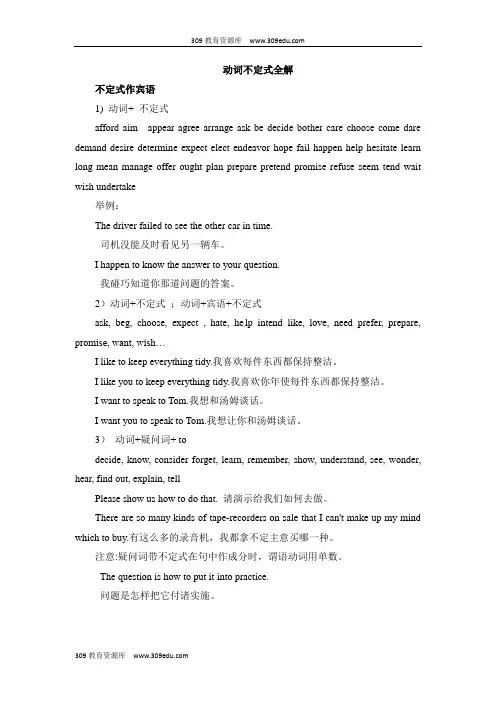
动词不定式全解不定式作宾语1) 动词+ 不定式afford aim appear agree arrange ask be decide bother care choose come dare demand desire determine expect elect endeavor hope fail happen help hesitate learn long mean manage offer ought plan prepare pretend promise refuse seem tend wait wish undertake举例:The driver failed to see the other car in time.司机没能及时看见另一辆车。
I happen to know the answer to your question.我碰巧知道你那道问题的答案。
2)动词+不定式;动词+宾语+不定式ask, beg, choose, expect , hate, he lp intend like, love, need prefer, prepare, p romise, want, wish…I like to keep everything tidy.我喜欢每件东西都保持整洁。
I like you to keep everything tidy.我喜欢你年使每件东西都保持整洁。
I want to speak to Tom.我想和汤姆谈话。
I want you to speak to Tom.我想让你和汤姆谈话。
3)动词+疑问词+ todecide, know, consider forget, learn, remember, show, understand, see, wonder, hear, find out, explain, tellPlease show us how to do that. 请演示给我们如何去做。
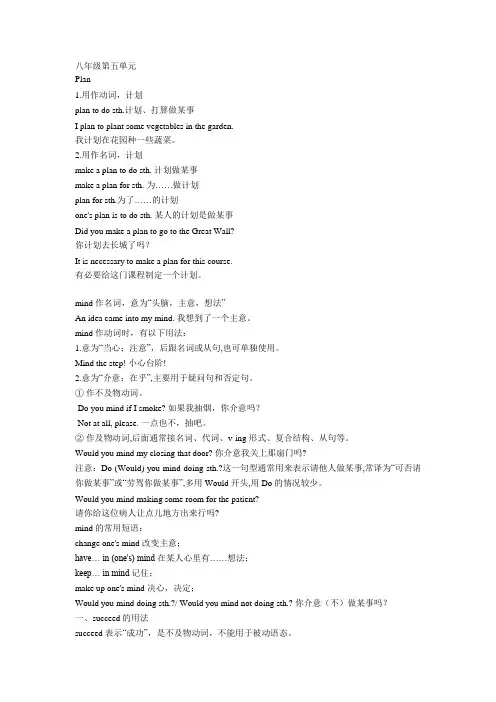
八年级第五单元Plan1.用作动词,计划plan to do sth.计划、打算做某事I plan to plant some vegetables in the garden.我计划在花园种一些蔬菜。
2.用作名词,计划make a plan to do sth. 计划做某事make a plan for sth. 为……做计划plan for sth.为了……的计划one's plan is to do sth. 某人的计划是做某事Did you make a plan to go to the Great Wall?你计划去长城了吗?It is necessary to make a plan for this course.有必要给这门课程制定一个计划。
mind作名词,意为“头脑,主意,想法”An idea came into my mind. 我想到了一个主意。
mind作动词时,有以下用法:1.意为“当心;注意”,后跟名词或从句,也可单独使用。
Mind the step! 小心台阶!2.意为“介意;在乎”,主要用于疑问句和否定句。
①作不及物动词。
-Do you mind if I smoke? 如果我抽烟,你介意吗?-Not at all, please. 一点也不,抽吧。
②作及物动词,后面通常接名词、代词、v-ing形式、复合结构、从句等。
Would you mind my closing that door? 你介意我关上那扇门吗?注意:Do (Would) you mind doing sth.?这一句型通常用来表示请他人做某事,常译为“可否请你做某事”或“劳驾你做某事”,多用Would开头,用Do的情况较少。
Would you mind making some room for the patient?请你给这位病人让点儿地方出来行吗?mind的常用短语:change one's mind 改变主意;have… in (one's) mind在某人心里有……想法;keep… in mind记住;make up one's mind 决心,决定;Would you mind doing sth.?/ Would you mind not doing sth.? 你介意(不)做某事吗?一、succeed的用法succeed 表示“成功”,是不及物动词,不能用于被动语态。
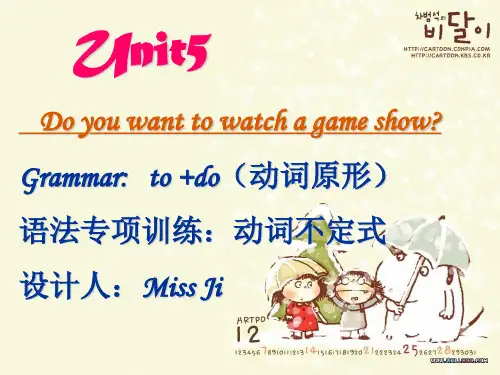
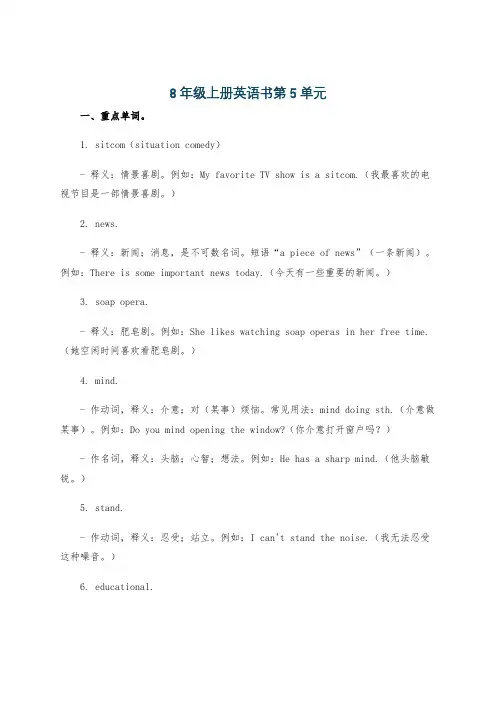
8年级上册英语书第5单元一、重点单词。
1. sitcom(situation comedy)- 释义:情景喜剧。
例如:My favorite TV show is a sitcom.(我最喜欢的电视节目是一部情景喜剧。
)2. news.- 释义:新闻;消息,是不可数名词。
短语“a piece of news”(一条新闻)。
例如:There is some important news today.(今天有一些重要的新闻。
)3. soap opera.- 释义:肥皂剧。
例如:She likes watching soap operas in her free time.(她空闲时间喜欢看肥皂剧。
)4. mind.- 作动词,释义:介意;对(某事)烦恼。
常见用法:mind doing sth.(介意做某事)。
例如:Do you mind opening the window?(你介意打开窗户吗?)- 作名词,释义:头脑;心智;想法。
例如:He has a sharp mind.(他头脑敏锐。
)5. stand.- 作动词,释义:忍受;站立。
例如:I can't stand the noise.(我无法忍受这种噪音。
)6. educational.- 释义:有教育意义的。
例如:This documentary is very educational.(这部纪录片很有教育意义。
)7. plan.- 作名词,释义:计划;打算。
例如:What's your plan for the weekend?(你周末的计划是什么?)- 作动词,释义:计划;打算。
常用搭配:plan to do sth.(计划做某事)。
例如:He plans to go to Beijing next month.(他计划下个月去北京。
)8. hope.- 作动词,释义:希望。
常用搭配:hope to do sth.(希望做某事);hope + (that)从句。

八年级上册英语第五单元语法知识总结
八年级上册英语第五单元的语法知识,是学习英语中的一个重要环节。
本单元主要讲述了现在完成时态的相关知识,这是一种表示过去发生的动作对现在造成影响的时态。
现在完成时态的结构是“have/has + 过去分词”,其中“have/has”表示现在完成时态的助动词,而“过去分词”则是表示过去动作的词。
例如,“I have finished my homework”表示“我已经完成了我的作业”。
现在完成时态的用法非常广泛,可以用来描述已经发生的事情、已经完成的动作或者已经存在的状态。
例如,“I have seen that movie”表示“我已经看过那部电影”。
此外,现在完成时态还可以用来表示过去的经历或者过去的习惯。
例如,“He has lived in China for five years”表示“他曾经在中国生活了五年”。
除了现在完成时态之外,本单元还介绍了延续性动词和非延续性动词的概念。
延续性动词是指动作可以持续一段时间的动词,例如“read”、“write”、“swim”等。
而非延续性动词则是指动作瞬间完成的动词,例如“jump”、“run”、
“eat”等。
在学习现在完成时态的过程中,需要注意与一般过去时态的区别。
一般过去时态表示过去某个时间点发生的动作或者过去经常发生的动作,而现在完成时态则表示过去发生的动作对现在造成了影响。
通过学习本单元的语法知识,我们可以更好地理解英语时态的变化和用法,提高我们的英语水平。
同时,我们还可以将这些知识应用到实际生活中,更好地表达自己的意思。
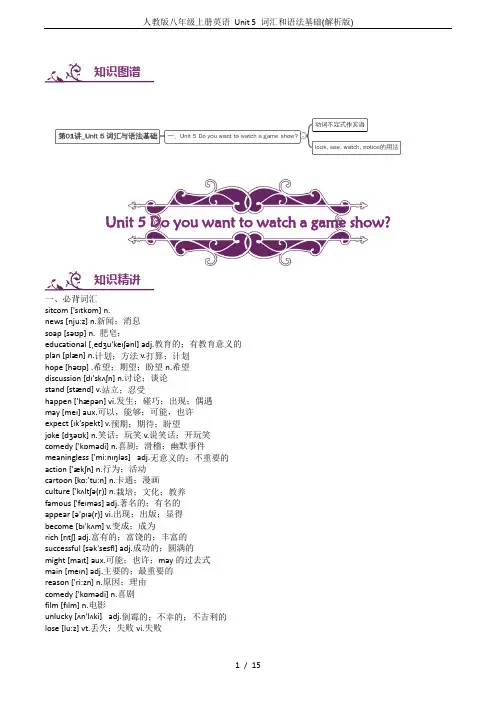
知识图谱Unit 5 Do you want to watch a game show?知识精讲一、必背词汇sitcom ['sɪtkɒm] n.news [njuːz] n.新闻;消息soap [səʊp] n. 肥皂;educational [ˌedʒu'keɪʃənl] adj.教育的;有教育意义的plan [plæn] n.计划;方法v.打算;计划hope [həʊp] .希望;期望;盼望n.希望discussion [dɪ'skʌʃn] n.讨论;谈论stand [stænd] v.站立;忍受happen ['hæpən] vi.发生;碰巧;出现;偶遇may [meɪ] aux.可以,能够;可能,也许expect [ɪk'spekt] v.预期;期待;盼望joke [dʒəʊk] n.笑话;玩笑v.说笑话;开玩笑comedy ['kɒmədi] n.喜剧;滑稽;幽默事件meaningless ['miːnɪŋləs]adj.无意义的;不重要的action ['ækʃn] n.行为;活动cartoon [kɑː'tuːn] n.卡通;漫画culture ['kʌltʃə(r)] n.栽培;文化;教养famous ['feɪməs] adj.著名的;有名的appear [ə'pɪə(r)] vi.出现;出版;显得become [bɪ'kʌm] v.变成;成为rich [rɪtʃ] adj.富有的;富饶的;丰富的successful [sək'sesfl] adj.成功的;圆满的might [maɪt] aux.可能;也许;may的过去式main [meɪn] adj.主要的;最重要的reason ['riːzn] n.原因;理由comedy ['kɑmədi] n.喜剧film [fɪlm] n.电影unlucky [ʌn'lʌki]adj.倒霉的;不幸的;不吉利的lose [luːz] vt.丢失;失败vi.失败girlfriend ['ɡɝlfrɛnd] n.女朋友ready ['redi] adj.准备好的;乐意的character ['kærəktə(r)] n.个性;品质;人物;simple ['sɪmpl] adj.简单的;朴素的;单纯的;笨的army ['aːmi] n.军队;陆军;一大批二、重点词汇1. hope verb /həʊp/to want something to happen or to be true, and usually have a good reason to think that it might 希望,盼望1). I'm hoping for an interview next week.我盼望着下星期有一次面试。
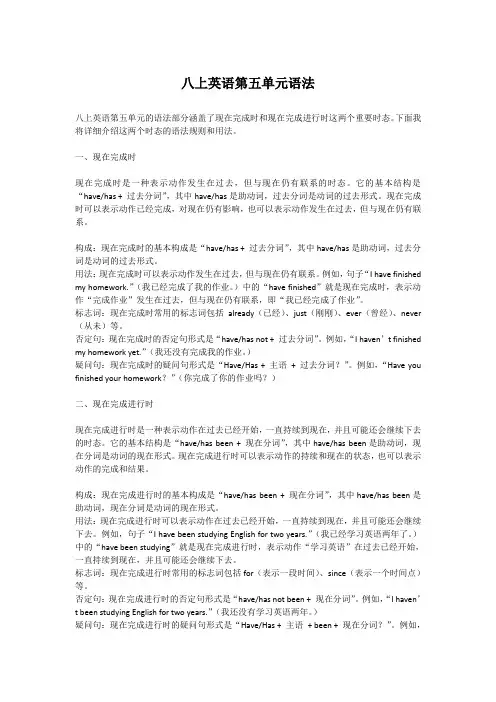
八上英语第五单元语法八上英语第五单元的语法部分涵盖了现在完成时和现在完成进行时这两个重要时态。
下面我将详细介绍这两个时态的语法规则和用法。
一、现在完成时现在完成时是一种表示动作发生在过去,但与现在仍有联系的时态。
它的基本结构是“have/has + 过去分词”,其中have/has是助动词,过去分词是动词的过去形式。
现在完成时可以表示动作已经完成,对现在仍有影响,也可以表示动作发生在过去,但与现在仍有联系。
构成:现在完成时的基本构成是“have/has + 过去分词”,其中have/has是助动词,过去分词是动词的过去形式。
用法:现在完成时可以表示动作发生在过去,但与现在仍有联系。
例如,句子“I have finished my homework.”(我已经完成了我的作业。
)中的“have finished”就是现在完成时,表示动作“完成作业”发生在过去,但与现在仍有联系,即“我已经完成了作业”。
标志词:现在完成时常用的标志词包括already(已经)、just(刚刚)、ever(曾经)、never (从未)等。
否定句:现在完成时的否定句形式是“have/has not + 过去分词”。
例如,“I haven’t finished my homework yet.”(我还没有完成我的作业。
)疑问句:现在完成时的疑问句形式是“Have/Has + 主语+ 过去分词?”。
例如,“Have you finished your homework?”(你完成了你的作业吗?)二、现在完成进行时现在完成进行时是一种表示动作在过去已经开始,一直持续到现在,并且可能还会继续下去的时态。
它的基本结构是“have/has been + 现在分词”,其中have/has been是助动词,现在分词是动词的现在形式。
现在完成进行时可以表示动作的持续和现在的状态,也可以表示动作的完成和结果。
构成:现在完成进行时的基本构成是“have/has been + 现在分词”,其中have/has been是助动词,现在分词是动词的现在形式。
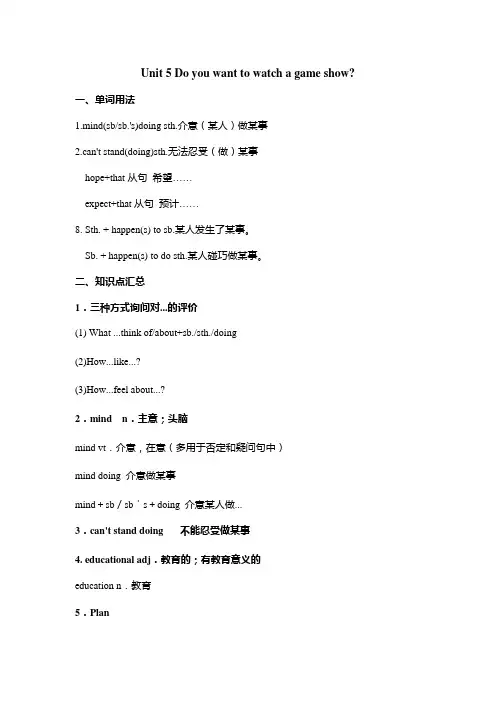
Unit 5 Do you want to watch a game show?一、单词用法1.mind(sb/sb.'s)doing sth.介意(某人)做某事2.can't stand(doing)sth.无法忍受(做)某事hope+that从句希望……expect+that从句预计……8. Sth. + happen(s) to sb.某人发生了某事。
Sb. + happen(s) to do sth.某人碰巧做某事。
二、知识点汇总1.三种方式询问对...的评价(1) What ...think of/about+sb./sth./doing(2)How...like...?(3)How...feel about...?2.mind n.主意;头脑mind vt.介意,在意(多用于否定和疑问句中)mind doing 介意做某事mind+sb/sb's+doing 介意某人做...3.can't stand doing 不能忍受做某事4. educational adj.教育的;有教育意义的education n.教育5.Planplan to do=make a plan to do 计划做某事make a plan for 为......制定计划6.news 一则消息 a piece of news7.find out“查出”,强调经过一番了解和查询,弄明白某一情况。
find“找到,发现”指偶然或意外地发现,着重指找到的结果。
8.discussiondiscussion n. have a discussion about sb/sthdiscuss v.讨论discuss sth with sb9.happen 发生、出现sth+happens/happened to sb"某人发生了某事”(常指不好的事)sb.happens/happened to do sth “某人碰巧做某事”happen 指偶然发生或突发事件的发生;take place 指按计划或事先安排的发生10.expect to do...期待/期望做什么expect sb to do 期待/期望某人做某事hope:指对愿望实现有一定信心的希望.hope to do 不能用hope sb to do11.meaningless adj.无意义的meaningful adj.有意义的meaning(s)n.意思mean(s)v.意味着,意思是12.Jenjoyable令人愉悦11Scared15.famous adj.著名的;出名的作为...而出名be famous as...因...而出名be famous for对...而言出名be famous to...16.such as 诸如...;像;比如...1 prep.超过more thanover prep. 在......的正上方over adj.完了的,结束的下课。
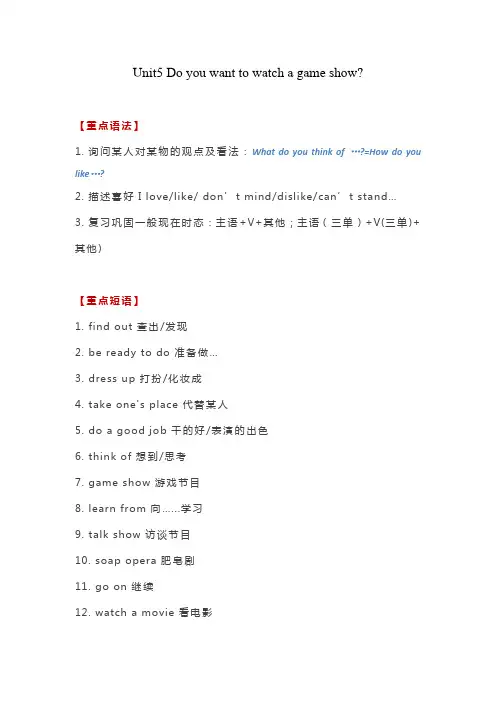
Unit5 Do you want to watch a game show?【重点语法】1. 询问某人对某物的观点及看法:What do you think of …?=How do you like…?2. 描述喜好I love/like/ don’t mind/dislike/can’t stand…3. 复习巩固一般现在时态:主语+V+其他;主语(三单)+V(三单)+其他)【重点短语】1. find out 查出/发现2. be ready to do 准备做…3. dress up 打扮/化妆成4. take one's place 代替某人5. do a good job 干的好/表演的出色6. think of 想到/思考7. game show 游戏节目8. learn from 向…...学习9. talk show 访谈节目10. soap opera 肥皂剧11. go on 继续12. watch a movie 看电影13. one of…其中之一14. try one’s best to =do one’s best to 竭尽全力15. a pair of 一双16. as famous as 一样闻名/出名17. look like 看起来像18. around the world 世界各地19. have a discussion about 讨论…...20. one day 有一天/某一天21. such as 例如22. a symbol of 一个象征/标志23. something enjoyable 快乐的事情24. interesting information 有趣的信息【词语辨析】1. want + n 想要……want to do sth 想要做某事want sb to do sth 想让某人做某事……2. mind 介意,其后+名词/代词/V-ing3. stand1)“站, 站立” e.g. Stand up! 起立2) “忍受”(多用于否定句、疑问句) , 后可+名/代/V-ing 4. plan vt. &vi.计划, 打算,plan to do sth.plan 还可作名词,如:make plans 制定计划5. v. discuss (讨论) + ion→n. discussionhad a discussion about sth. 对某事进行讨论6. happen v. 发生; 出现sth+ happens to sb.”或“sth happened + 时间/地点”句式7. 情态动词may 语气弱于can,意为“可能”might 表推测,语气最弱,意为“可能”may/might not 表示否定推测时语气最弱,意为“可能不”They may not be very exciting. 它们可能不是那么令人兴奋。
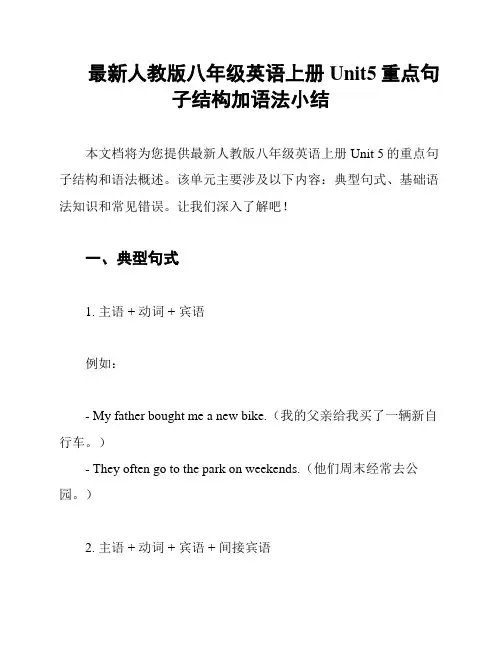
最新人教版八年级英语上册Unit5重点句子结构加语法小结本文档将为您提供最新人教版八年级英语上册Unit 5的重点句子结构和语法概述。
该单元主要涉及以下内容:典型句式、基础语法知识和常见错误。
让我们深入了解吧!一、典型句式1. 主语 + 动词 + 宾语例如:- My father bought me a new bike.(我的父亲给我买了一辆新自行车。
)- They often go to the park on weekends.(他们周末经常去公园。
)2. 主语 + 动词 + 宾语 + 间接宾语例如:- She gave her friend a birthday present.(她给她的朋友一份生日礼物。
)- The teacher showed the students a new way to solve the math problem.(老师给学生展示了一种解决数学问题的新方法。
)3. 主语 + 动词 + 宾语 + 宾语补足语例如:- We elected him class monitor.(我们选他当班长。
)4. 主语 + 系动词 + 表语例如:- She is a talented singer.(她是一位有才华的歌手。
)- The book seems interesting.(这本书看起来很有趣。
)二、基础语法知识1. 一般现在时一般现在时用于表达经常性、惯性的动作或现实情况。
例如:I go to school every day.(我每天上学。
)2. 一般过去时一般过去时用于过去某个时间发生的动作。
例如:She visited her grandparents last weekend.(她上个周末去看望她的祖父母。
)3. 现在进行时现在进行时用于表示现在进行中的动作。
例如:They are playing basketball in the park.(他们正在公园里打篮球。
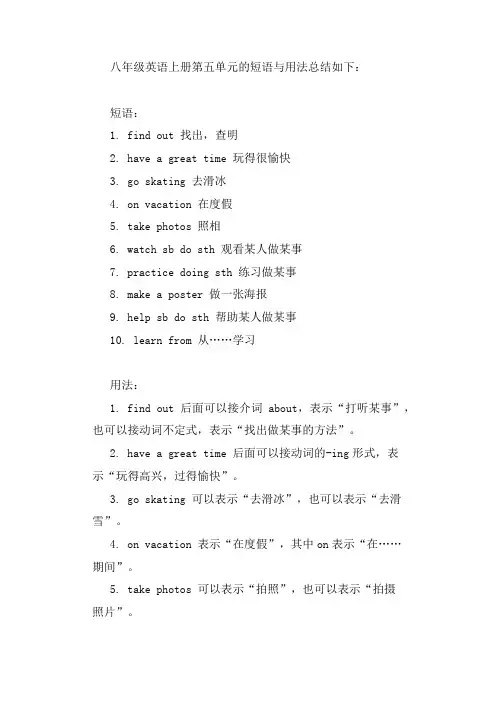
八年级英语上册第五单元的短语与用法总结如下:短语:1. find out 找出,查明2. have a great time 玩得很愉快3. go skating 去滑冰4. on vacation 在度假5. take photos 照相6. watch sb do sth 观看某人做某事7. practice doing sth 练习做某事8. make a poster 做一张海报9. help sb do sth 帮助某人做某事10. learn from 从……学习用法:1. find out 后面可以接介词about,表示“打听某事”,也可以接动词不定式,表示“找出做某事的方法”。
2. have a great time 后面可以接动词的-ing形式,表示“玩得高兴,过得愉快”。
3. go skating 可以表示“去滑冰”,也可以表示“去滑雪”。
4. on vacation 表示“在度假”,其中on表示“在……期间”。
5. take photos 可以表示“拍照”,也可以表示“拍摄照片”。
6. watch sb do sth 表示“观看某人做某事”,其中watch表示“观看”,do表示“做某事”。
7. practice doing sth 表示“练习做某事”,其中practice表示“练习”,doing表示“做某事”。
8. make a poster 表示“做一张海报”,其中make表示“制作”,poster表示“海报”。
9. help sb do sth 表示“帮助某人做某事”,其中help表示“帮助”,do表示“做某事”。
10. learn from 表示“从……学习”,其中learn表示“学习”,from表示“从……”。
人教版八年级上册英语Unit5语法要点
本文档总结了人教版八年级上册英语Unit5的语法要点,其中包括:
宾语从句
- 宾语从句是由连接词引导的从句,用作主句的宾语。
- 常见的连接词有:that, whether, if等。
- 宾语从句的时态要根据主句的时态来确定。
同位语从句
- 同位语从句是由连接词引导的从句,用来解释说明名词的具体内容。
- 常见的连接词有:that, whether, if等。
- 同位语从句通常紧跟在被解释的名词后面。
名词性从句
- 名词性从句是由连接词引导的从句,用作句子的主语、宾语
或表语。
- 常见的连接词有:that, whether, if等。
- 名词性从句的类型包括宾语从句、同位语从句和主语从句。
语序变换
- 在宾语从句、同位语从句和名词性从句中,动词的语序要进
行变换。
- 在陈述语句中,连接词引导的从句中的语序与主句的语序保
持一致。
- 在疑问语句中,连接词引导的从句中的语序为陈述句的语序。
以上是人教版八年级上册英语Unit5的语法要点总结,希望对
您有所帮助。
Unit 5 Do you want to watch a game show一、必背短语【教材内容解析】Section A1.What do you think of talk shows? (P. 33)show用作可数名词,意为“节目”,talk show表示“访谈节目”。
He is a talk show host.What’s your favourite TV show?【拓展】show用作名词,还可以表示“展览、表演”,on show表示“在展览中”,另外,show还可以用作及物动词,表示“给……看、展示”。
Some famous paintings are on show now.Can you show your new phone to me?2.I don’t mind them. (P. 33)① mind doing sth. 介意做某事Would you mind ______________(open) the window please?② mind sb’s/sb doing sth. 介意某人做某事Do you mind my/me ______________(call) you at night?3.news (P. 33)news用作不可数名词,表示“新闻”,a piece of news表示“一则新闻”,news在句中作主语时,谓语动词用单数形式。
The news ______________(make) the children excited.No news is good news.4.can’t stand (P. 33)stand此处用作及物动词,表示“忍受”,用于否定句和疑问句中,can’t/couldn’t stand doing sth.“不能忍受做某事”。
I can't stand the bad weather.He can’t stand ______________(live) here any longer.5.Then let’s watch a talk show. (P. 33)(1) let作使役动词,意为“允许、让”,let sb. (not) do sth.“让某人做某事”。
八年级上册第五单元语法1.show (n).节目=program (v)展示2.be on show在上映show sb. sth.=show sth to sb.把某物展示给某人看(当sth是代词,就只能用show sth. to sb.) show it to meshow up 出现,到场show off炫耀show sb. around带领某人参观3.news新闻(u.n.) paper纸张(u.n.)newspaper报纸(c.n.)a lot of news许多新闻 a piece of news一条新闻4.mind(v.)介意+ving/n./pron. Never mind.别介意。
Would you mind one’s doing sth.?你介意某人做某事吗?Of course not./Not at all.(不介意)I’m sorry, but......(介意)5.stand-stood stand up 起立can’t stand doing sth.不能忍受做某事(常用于否定句疑问句)6.What do you think of...?=How do you like...?用于询问意见的方法May I...? Yes, you may. No, you can’t. may 1)表示请求建议2)表示推测7.hope /wish to do sth.希望做某事wish sb. to do sth.希望某人做某事hope that从句(希望是可以实现的)wish that从句(愿望不能或很难实现)hope u.n. project hope希望工程new hope新的希望8.learn学习(表示初步)study(研究)learn to do sth学习做某事learn from从......中学9.plan planned plan to do sth.计划做某事make a plan to do sth. have a plan to do sth.10.look for 寻找(过程)find找到(结果)find out查明(调查的结果)11.go on 发生(happen):What’s going on here? What’s happening here?这里发生了什么?进展:How did you go on in your study? 你的学习进展得怎么样?继续做同一件事:go on doing sth = go on with sth. It will go on raining all day.整天都在下雨。
八年级上册Unit5语法知识点Unit 5是英语八年级上册学习的一个重要单元,其中语法知识点是重中之重。
本文将为大家详细讲解Unit 5中的核心语法知识点,希望对大家的学习有所帮助。
一、动词的时态动词的时态是八年级上语法中非常关键的一个知识点。
英语中动词的时态包括现在时、过去时和将来时。
现在时又包括一般现在时、现在进行时和现在完成时。
1.一般现在时一般现在时表示的是习惯性、经常性的动作或状态。
一般现在时的构成为:主语+动词原形(第三人称单数要加-s)。
例如:She often goes to the gym after work.2.现在进行时现在进行时表示的是正在进行的动作。
现在进行时的构成为:主语+be动词+动词ing。
例如:I am watching TV now.3.现在完成时现在完成时表示的是过去发生的动作对现在的影响或结果。
现在完成时的构成为:主语+have/has+过去分词。
例如:She has finished her homework.4.过去时过去时表示的是已经发生过的动作。
过去时的构成为:主语+动词过去式。
例如:We went to the park yesterday.5.将来时将来时表示的是将要发生的动作。
将来时的构成为:主语+will+动词原形。
例如:I will study hard for the test tomorrow.二、被动语态被动语态在英语语法中也是一个非常重要的知识点。
被动语态的构成为:be动词+过去分词。
被动语态的使用需要注意下面几点:1.主语是动作的承受者,谓语是做动作的人或事物。
2.一些动词不常用被动语态,如:believe、like、want、know 等。
3.有些动词本身就是不及物动词,不能使用被动语态。
例如:The book was written by him.(这本书是他写的。
)三、直接引语和间接引语直接引语是指直接引用他人的话。
例如:He said, “I’m verytired today.”间接引语则是将他人的话转述过来。
姓名_______________ 上课时间__________________Unit 5 语法:动词不定式动词不定式作宾语1.构成基本形式:to+动词原形;有时可以不用to,to是不定式符号,本身无词义。
否定形式:not+(+to)动词原形2.句法功能:不定式可以作主语,表语,宾语,宾补,定语,状语,也就是除谓语动词之外的任何成分。
3.本单元重点是不定式宾语。
(1)只能接to do作宾语的动词:三个希望两答应:hope,wish,want,agree,promise。
两个要求莫拒绝:demand,ask,refuse。
设法学会做决定:manage,learn,decide。
不要假装做选择:pretend,choose。
还有would like,like,plan,expect等表示命令、打算或希望的。
(2)在find,think等后跟不定式作宾语时,常用it代替,而真正的宾语放在后面。
I find it easy to read English every day。
(3)常见的一些不带to的不定式:Why not do…,why don’t you do…,had better(not)do…,would rather do…,could/would/will you please(not)…。
I would rather stay at home。
(4)只能作某些动词的宾语,不能作介词的宾语。
(5)不定式常和疑问词what,which,when,where,how连用,相当于一个宾语从句。
He didn’t know where to go。
(6)有些动词后面跟动词不定式时,应将不定式符号to省去。
常见的动词有let,make,feel,help,watch,hear等感官动词和使役动词。
这是动词不定式作宾补。
一感(feel)、二听(hear,listen to)、三让(let,make,have)、四看(look at,see,watch,notice)。
八年级上册英语第五单元语法知识点
反意疑问句:
用于对某一事物或观点没有确切的`把握,或者用于加强自己的观点。
陈述句+简短的一般疑问句 [助动词/be动词/情态动词+代词]
肯定或否定与陈述句的主语一致
肯定否定
否定肯定
注意:
1. 反问部分的be动词,助动词或情态动词要与陈述句部分一致。
2. 陈述句与反问句在时态和人称上要一致。
3. 陈述句部分如果为否定句或含有否定意义的词(如:nothing,never, little, few等),反问句要用肯定式;陈述句部分如果式肯定句,反问部分要用否定式。
例:
He was not at home at that time, was he?
May listens to pops everyday, doesn’t she?
We know nothing about him, do we?
You haven’t heard of him, have you?
4. 当句子为祈使句时,反问句一般用will you,表示请求或建议对方作某事,询问对方是否愿意。
注:当祈使句为“Let’s ...”结构时,用shall we 反问。
Drive more slowly, will you?
Let’s walk out of the library quietly, shall we?
5. 回答:看陈述句的肯定部分,当事实为肯定时,用Yes;事实为否定时,用No。
当陈述句为否定句时,把否定部分忽略,只看肯定部分的意思。
【八年级上册英语第五单元语法知识点】。
八年级英语Units 5单元语法非谓语动(固定用法)常见动词不定式词组、句型用法总结1. 动词不定式宾语和宾语补足语以下动词后常跟不定式作宾语和宾语补足语want to do sth agree to do sthdecide to do sth plan, to do sthlearn to do sth hope to do sthfail to do sth happen to do sth ,offer to do sth try to do sthwould like to do sth remember to do sthforget to do sth seem to do sthvolunteer to do sth help sb do sth /to do sthin order to do sth get/be ready to dowish sb. to do sth. can’t wait to dohave to do sth can/can’t afford t domake a decision to do sth, be sure to do sthbe able to do sth stop to do sthallow sb to do sth ask sb to do sthtell sb to do sth show (sb) to do sthteach (sb)to do sth invite (sb) to do sthencourage(sb)to do sth prefer to do sthrefuse(sb)to do sth expect to do sthsb need to do sth / sth need doing/ sth need to be done2 sb be + adj(表示人心情的词)+ to do sthsb+be +sorry / glad / surprised / pleased / angry / happy / sure /excited/ amazed/relaxed/ lucky/ to do sth3.. too …to do sth too +adj/adv+ to do sth4.….enough to do sth adj/adv+ enough +(for sb )to do sth5 疑问词+不定式:how ,when , where, what, which + to do sth6 .固定短语后用动词不定式:(do)try one’s best to do sth,It takes sb some time to do sth,It’s one’s turn to do sth.It’s time(for sb.) to do sth.find/think/feel it +adj. to do sth.It’s + adj + to do sthIt’s + adj + of / for sb to do sthIt’s easy / hard / important/ / impossible / interesting / difficult / necessary / …for sb to do sth(adj描述不定式to do sth的特征,性质时常用for sb)It’s good / kind / nice / wise / clever/ rude / patient / polite / foolish / right / wrong / careful of sb to do sth (描述主语人的性质,身份和特征时常用of sb)7 .the+序数词first/second/third…+名词/代词+to do sth表示第几做…8..名词或代词+不定式。
不定式to do 放名词或代词后修饰名词或代词I need something to drink he has no money to buy a computer \smile is the best way to make new friends they need a room to live in9.不定式to do 可用来表示目的可放句首.句末一用所给动词的适当形式填空。
1..Where do you plan (go) this Sunday?2...I hope (watch) the action movie one day.3.. It’s too cloudy and seemed ________(rain). The farmers had to hurry home.4... He had no chance _______(get) education.5.. ---Have you decided where _________(take) your wedding holiday?---Not yet.6. . Mike wasn’t tall enough _________(reach) the clock on the wall.7. . He thinks it a good habit________(get) up early in the morning.8... I’m sorry _______(trouble) you, but could you show me how _______(use) the micro-wave oven?9...can you help me _________( take)care of my baby10. . Would you like __________(join) us in playing soccer11.We were surprised _________(hear) the bad news12.Please remember ( bring) your homework here13.My sister wants ( study )hard at Math14.They agree ( have ) a sports meeting15.The little girl decided ( buy ) a gift for her mother16.in order ( get ) good grades ,Bob studies harder than before17. Junk food is bad for our health , we should try ( eat) less18. My grandpa is a kind man , he is always ready ( help ) others19.My parents expect me (find) a good job20.The boy is too excited ( say ) a word21 .I will try my best (help ) you22.I find it difficult for me ( get ) up early on so cold days23. It is easy ( learn ) English if you are hard-working24.It usually takes us an hour (finish ) the homework25. My teacher often tells me ( be ) brave and active in class二单项选择。
1. ---why do you get up so early every morning ---- the early busA. To catch B catching C. caught D is catching2.-Why didn’t you drive your car to work? ---Because it is broken and needs __A. to be repairedB. repairingC.to repair D .A&B3. ..Don’t forget________a recycle bag with you when you go shopping.A. takeB. takingC. to takeD. took4.. I found it very difficult ___ _ along with my roomate.A. to getB. gettingC. gotD. gets5.. . --How soon do you expect ________ abroad in England? ---In a year.A. studying B. to study C. will study D. study6. The doctor told him ______any more because of his bad health.A. to not drink B . not drinking C. not to drink D. didn’t drink7. The boy stopped _______ computer games and began to do his homeworkA. to play,B. to play,C. playing,D. play8 . ---Have you finished your the novel?---Not yet. I’ll try _____it back to you before Saturday.A., givingB., to giveC., give D ,gave9 .. It took me about six hours ______to Guangzhou by coach from Zhanjiang.A. getB. to gerC. gotD. getting10.. .In our school, the students aren’t allowedA. smokeB. to smoke C smokin11. If you happen _______ David, tell him ______me a call.A. to see, to giveB. to see, givingC. seeing, to giveD. seeing, giving12. ---Have you chosen which dress ______at your birthday party?A. will you wearB. to wearC. wearingD. wore13... —Why is Tom practicing playing basketball every day?— a famous basketball player. A Be . Been C.To be .D o beingⅢ. Unit 5 典型句子练习1. 我最喜爱的电视节目是访谈节目和达人秀节目。